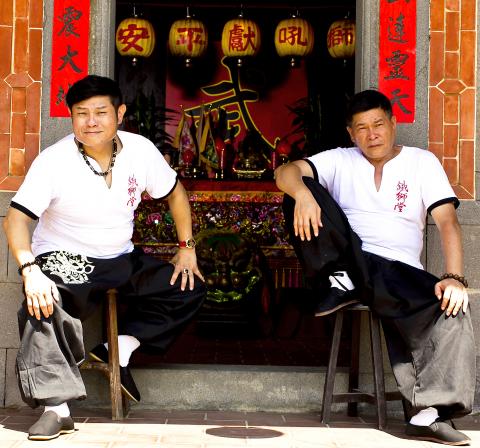Two of Taiwan’s most beloved grassroots comedians, Peng Chia-chia (澎恰恰) and Hsu Hsiao-shun (許效舜), join hands to lead a comedic drama named after their most iconic variety show, Iron Lion Jade Dragon (鐵獅玉玲瓏), which sounds like a recipe for a Lunar New Year blockbuster. And for the holiday crowd looking for a few laughs, Peng and Hsu are as fun, witty and boisterous as ever. As a narrative film, however, Lion Dancing (鐵獅玉玲瓏) goes down like a poor pastiche of 2012 box-office sensations Din Tao: Leader of the Parade (陣頭) and My Dear Next Door (隔壁親家), a popular Taiwanese musical and comedy that premiered in 2009, and co-starring the comedian duo.
While dintao (陣頭), a type of traditional temple performance troupe, is the focal point in seasoned television director Fung Kai’s (馮凱) Din Tao, Lion Dancing, directed by Peng, builds the story around the traditional lion dance performed at temple fairs. The heads of the two families embroiled in a long-running feud in My Dear Next Door are reincarnated as Chin-tieh (Peng) and Lin Lung (Hsu), best friends who studied lion dance under the same master, but who eventually have a falling out over girls. Decades later, Chin-tieh clings to tradition amid declining audiences, struggling for his troupe to make ends meet. Meanwhile, Lin Lung and his vaudeville group flourish by performing pole dances on the electric flower car (電子花車), a large truck refashioned with a stage, special lighting, loud, showy decorations and a sound system.
The disagreement between the two remains, but their grown-up children, Hui-hsin (Alice Ko, 柯佳嬿) and Shang-chih (Yao Yuan-hao, 姚元浩), have fallen for each other like Romeo and Juliet. Soon, the real enemy appears, which, in this particular case, takes the form of a business mogul played by male model Jerry Huang (黃志瑋). Chin-tieh and Lin Lung now know it is time to reunite and team up together in order to defeat the foreign invader who tries to eradicate the traditional lion dance troupe.

Photo courtesy of Good Kids
Despite the same Chinese title, the movie has little to do with the immensely popular television show inspired by the traditional Taiwanese performance art form known as liamkua (唸歌), which interweaves talking and singing. The only thing in common is the electrifying performance by long-term performing partners and close friends Peng and Hsu, who captivate with their witty, fast and sometimes satirical humor which may be largely lost in translation to audience members reliant on subtitles.
But comic moments alone cannot make a movie. When the two are not on screen together, the film feels stale, overloaded with underdeveloped plots and characters. The string of cameos by local entertainers including Tai Chih-yuan (邰智源), Sung Shao-ching (宋少卿), Honduras (洪都拉斯) as well as drag performer Hu BB (胡BB) from the Snow White Entertaining Troupe (白雪綜藝劇團) show abundant comic potential that’s sadly never realized. Even the rare appearance of Monique Lin (林慧萍), a popular singer in the 1980s, on the silver screen is nothing short of awkward and bland.
While there is nothing wrong to copy past success, Lion Dancing looks and feels like an unpolished work that fails to bring flesh and blood into a formulaic story.

June 23 to June 29 After capturing the walled city of Hsinchu on June 22, 1895, the Japanese hoped to quickly push south and seize control of Taiwan’s entire west coast — but their advance was stalled for more than a month. Not only did local Hakka fighters continue to cause them headaches, resistance forces even attempted to retake the city three times. “We had planned to occupy Anping (Tainan) and Takao (Kaohsiung) as soon as possible, but ever since we took Hsinchu, nearby bandits proclaiming to be ‘righteous people’ (義民) have been destroying train tracks and electrical cables, and gathering in villages

Swooping low over the banks of a Nile River tributary, an aid flight run by retired American military officers released a stream of food-stuffed sacks over a town emptied by fighting in South Sudan, a country wracked by conflict. Last week’s air drop was the latest in a controversial development — private contracting firms led by former US intelligence officers and military veterans delivering aid to some of the world’s deadliest conflict zones, in operations organized with governments that are combatants in the conflicts. The moves are roiling the global aid community, which warns of a more militarized, politicized and profit-seeking trend

The wide-screen spectacle of Formula One gets a gleaming, rip-roaring workout in Joseph Kosinski’s F1, a fine-tuned machine of a movie that, in its most riveting racing scenes, approaches a kind of high-speed splendor. Kosinski, who last endeavored to put moviegoers in the seat of a fighter jet in Top Gun: Maverick, has moved to the open cockpits of Formula One with much the same affection, if not outright need, for speed. A lot of the same team is back. Jerry Bruckheimer produces. Ehren Kruger, a co-writer on Maverick, takes sole credit here. Hans Zimmer, a co-composer previously, supplies the thumping

Dr. Y. Tony Yang, Associate Dean of Health Policy and Population Science at George Washington University, argued last week in a piece for the Taipei Times about former president Ma Ying-jeou (馬英九) leading a student delegation to the People’s Republic of China (PRC) that, “The real question is not whether Ma’s visit helps or hurts Taiwan — it is why Taiwan lacks a sophisticated, multi-track approach to one of the most complex geopolitical relationships in the world” (“Ma’s Visit, DPP’s Blind Spot,” June 18, page 8). Yang contends that the Democratic Progressive Party (DPP) has a blind spot: “By treating any